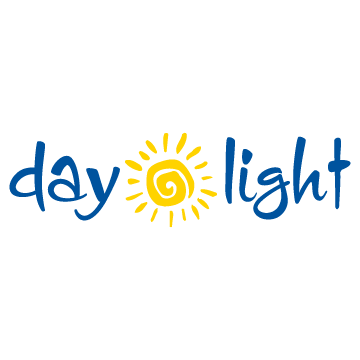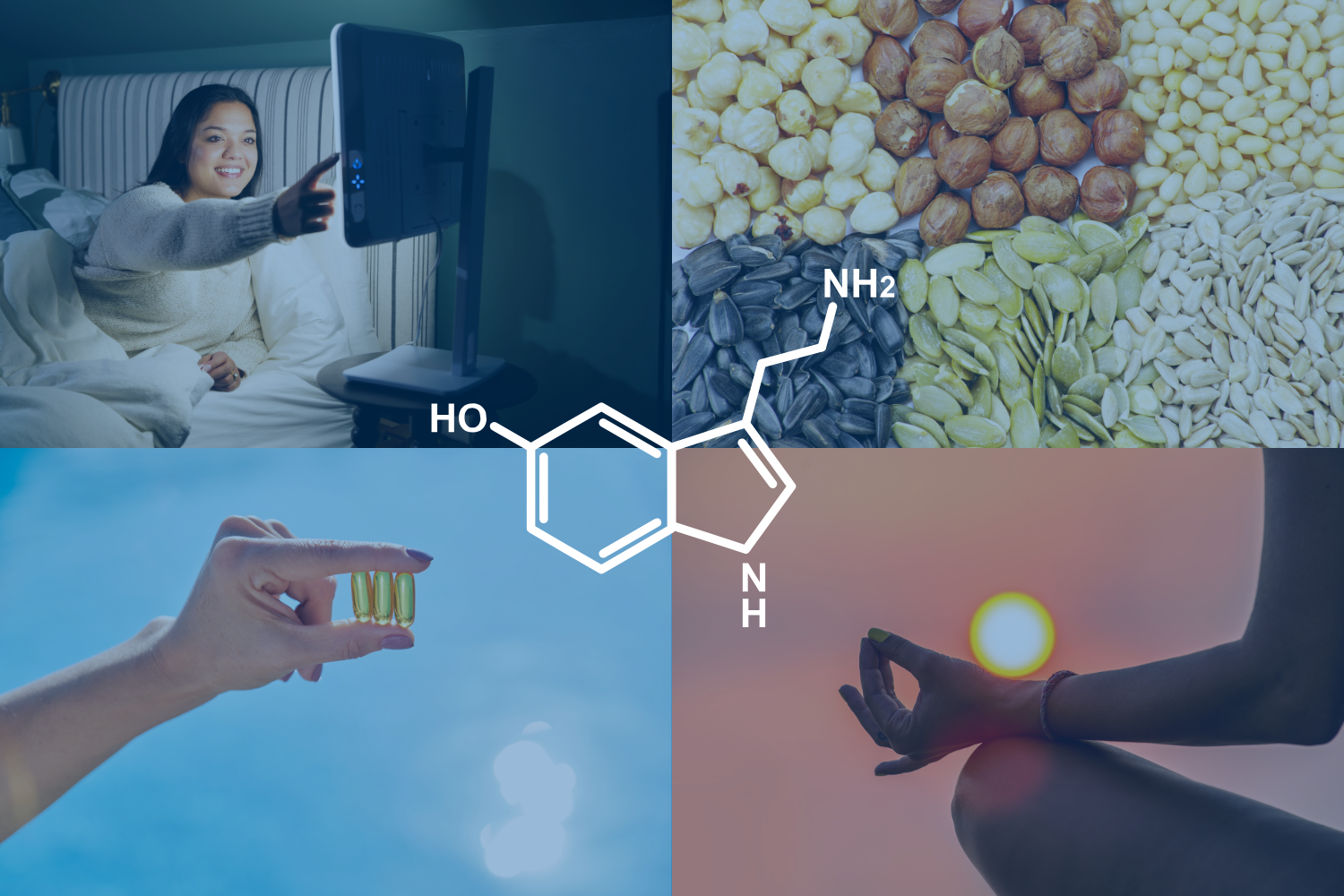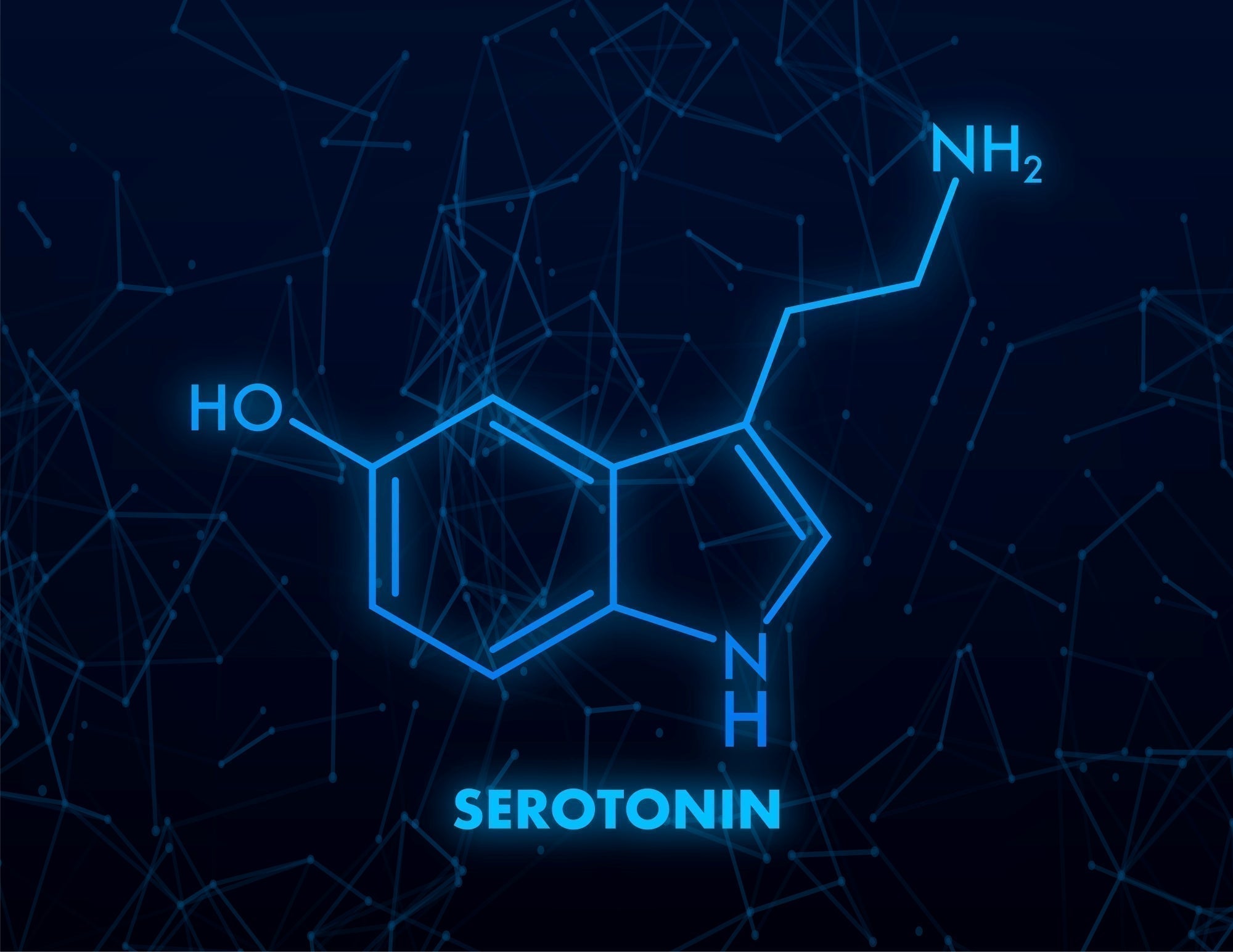Serotonin is a neurotransmitter that plays a vital role in the body. It helps regulate and balance several functions, including mood, sleep, and digestion. The body uses serotonin to send signals between your nerve cells. These signals affect various functions, including emotions, mood, and sleep.
If serotonin levels are too low or depleted, it can adversely affect your sleep-wake cycle and mood.
Lifestyle factors, including diet, exercise, and exposure to light, can impact your serotonin levels. The good news is that many of these factors are controllable, and there are natural ways to boost serotonin levels. For example, light exposure may help naturally increase serotonin levels.
Not everyone can get some light exposure daily. Fortunately, light therapy, which mimics natural sunlight, can be beneficial. Since 1993, Day-Light has been a leader in light therapy, a proven method of improving serotonin levels in the brain. We’ve conducted extensive research to gain a deeper understanding of serotonin and its role in overall well-being.
Natural Ways to Increase Serotonin Through Diet
There are several natural ways to increase serotonin through diet, including those listed below.
Tryptophan-Rich Foods: Building Blocks of Serotonin
Tryptophan is an essential amino acid and a building block necessary to help produce serotonin. Your body converts tryptophan into serotonin through a two-step physiological process.
Adding tryptophan-rich foods may help promote the production of serotonin. Foods high in tryptophan include:
- Turkey
- Seeds
- Nuts
- Salmon
- Spinach
- Eggs
- Dairy
- Beans
- Quinoa
Example meal plans to add tryptophan into your diet include:
- Two-egg omelet with spinach
- Grilled salmon with a side of quinoa and beans
- Greek yogurt with nuts and seeds mixed in
- Turkey salad mixed with seeds, quinoa, and Greek yogurt instead of mayo
Complex Carbohydrates: Fueling Serotonin Production
Eating complex carbohydrates helps provide the fuel your body needs to produce serotonin. When you eat complex carbohydrate foods, your body breaks them down, resulting in the release of insulin. Simultaneously, tryptophan and other amino acids compete for transport to cross the blood-brain barrier.
Insulin released into the bloodstream promotes the absorption of amino acids by muscle cells. This reduces competition from these other amino acids and increases tryptophan availability to cross the blood-brain barrier, promoting serotonin production.
Good sources of healthy complex carbohydrates include:
- Quinoa
- Sweet potatoes
- Brown rice
- Legumes
The Gut-Brain Connection: Probiotics and Serotonin
Research continues on the gut-brain connection. Your brain and gut continually exchange signals through multiple pathways, including your nervous system. Increasing research suggests that your gut microbiome may affect your overall health.
About 90% of serotonin is made in the enterochromaffin cells of the gut. This means that gut health can affect serotonin production.
Your gut microbiome may influence the amount of tryptophan available. This can affect how gut cells produce and release serotonin. The connection between serotonin levels and gut microbes is part of the gut-brain axis.
Various studies cite the connection between the gut-brain axis. An article in Integrative Medicine, a Clinician's Journal, found a clear link between mood disorders and GI issues. Disorders like depression and anxiety are connected to problems like irritable bowel disease. The authors concluded that the gut microbiome may play a role in specific psychological comorbidities.
Maintaining a healthy gut microbiome can be beneficial for your overall well-being. One way to maintain a healthy gut is by including probiotics in your diet. Probiotics are live yeast and bacteria that may help strengthen healthy bacteria in your gut.
Foods containing probiotics include:
- Yogurt
- Sauerkraut
- Tempeh
- Kimchi
Probiotics are also available in supplement form. As always, it is best to speak to your healthcare provider before starting probiotic supplementation.
Omega-3 Fatty Acids: Supporting Brain Health
Omega-3 fatty acids partially influence serotonin production and release.
Omega-3 fatty acids can increase cell membrane fluidity, allowing serotonin to bind more easily to serotonin receptors. Also, omega-3 fatty acids may reduce the production of specific prostaglandins, which can interfere with the release of serotonin. This helps increase serotonin production.
Foods rich in omega-3 fatty acids include:
- Fatty fish, such as mackerel and salmon
- Flaxseeds
- Chia seeds
- Walnuts
Lifestyle Practices for Natural Serotonin Boost
There are several healthy lifestyle practices to boost serotonin levels naturally, including the following:
Sunlight Exposure and Bright Light Therapy: The Vitamin D and Circadian Rhythm Connection
Exposure to natural sunlight or bright light therapy may also increase serotonin naturally. Sun exposure triggers the production of vitamin D. Through a complex physiological process, vitamin D can help convert tryptophan into serotonin.
Sunlight also helps cue the body's internal clock, also known as the circadian rhythm. For example, exposure to sunlight in the morning can help suppress melatonin production, a hormone that promotes sleep. Inadequate sunlight exposure can also impact vitamin D levels, serotonin production, and the circadian rhythm.
Not everyone can get exposed to sunlight every day. That's where bright light therapy may come in. Light therapy mimics natural sunlight and produces similar effects.
Bright light therapy may help increase serotonin levels. It can also regulate circadian rhythms like natural sunlight.
To achieve the best results from light therapy, it's essential to follow specific guidelines.
- Use devices that provide an output of 10,000 LUX for optimal results.
- Sit or stand at the correct distance from the lamp, as specified by the manufacturer's instructions.
- Keep your eyes open, but do not stare directly into the light.
- Begin with 20 to 30 minutes of gentle exposure to light.
Individuals who get natural sunlight should follow safe sun exposure guidelines. Too much UV sun exposure can increase the risk of skin cancer and other adverse health effects. The time you can safely spend in the sun depends on your skin tone and the UV index.
Generally, 5 to 15 minutes of midday sun exposure may help promote vitamin D synthesis without causing harm.
Regular Exercise: Moving Your Way to Happiness
If you are wondering how to naturally increase serotonin, exercise is one of your best options. According to Harvard Medical School, exercise, such as aerobic exercise and resistance training, may increase serotonin levels. When you exercise, your body produces higher levels of tryptophan, which helps promote the production of serotonin and endorphins. Regular exercise and increased serotonin production can help decrease pain, improve mood, and boost energy levels.
Aim to get 20 minutes of exercise daily, such as
- Brisk walking
- Hiking
- Swimming
- Circuit training
- Aerobic dance
Stress Management: Calming the Mind, Boosting Serotonin
Natural ways to increase serotonin also include practicing stress management techniques.
When you become stressed, your body may release cortisol. Cortisol can affect the production of serotonin and the availability of serotonin receptors. Specifically, chronic stress can reduce the number of serotonin receptors on the neurons. Even when serotonin is released, fewer receptors may bind with it, and levels decrease.
Stress-reduction techniques, such as mindfulness meditation, yoga, and deep breathing, may help promote relaxation. It's helpful to be consistent with stress reduction techniques to become proficient in them. For example, consider starting your morning with light yoga stretches and deep breathing exercises. End your day with a 5-minute meditation to help reduce the stresses of the day.
Prioritizing Sleep: Rest and Restore Serotonin Levels
While you sleep, your brain helps replenish certain chemicals, such as dopamine and serotonin. It's not just the number of hours you sleep but the quality of your sleep that plays a role in serotonin levels. When you enter slow-wave sleep, it helps regenerate cells and promote the production of neurotransmitters, including serotonin.
According to the Sleep Foundation, adopting certain sleep hygiene practices can be beneficial for achieving restful sleep. Consider the following:
- Maintain a consistent sleep-wake cycle.
- Create a cool, dark, and quiet environment for sleeping.
- Practice stress management techniques to unwind at the end of the day.
- Create a relaxing bedtime routine to help promote sleep
- Get some sunlight exposure during the day
- Limit heavy meals before bedtime
- Get regular exercise
- Reduce alcohol consumption
Massage Therapy: Physical Touch and Serotonin Release
Massage may also help improve serotonin levels. For example, massage may help with relaxation and reduce cortisol levels, which subsequently can facilitate serotonin production. Physical touch, such as massage, can stimulate the autonomic nervous system. This can help lead to the release of serotonin.
Supplementation: Supporting Serotonin Levels
Taking certain supplements may also help support serotonin levels.
5-HTP: A Direct Serotonin Precursor
5-hydroxytryptophan (5-HTP) is an amino acid produced from tryptophan. The body converts 5-HTP into serotonin. Increasing levels of 5-HTP may be beneficial in promoting serotonin levels.
More research is needed to determine the exact safe dosage for 5-HTP. According to Medline Plus, taking up to 400 mg daily may be safe for up to one year. However, speaking with your healthcare provider before starting supplementation with 5-HTP is essential.
Probiotic Supplements: Enhancing Gut Health
As mentioned above, probiotics may help enhance gut health, which in turn can lead to increased serotonin production. Selecting a probiotic from a reputable brand is vital to ensure quality.
According to the Cleveland Clinic, recommended strains of probiotics include:
- Lactobacillus
- Bacillus
- Bifidobacterium
The supplement's label indicates the number of viable cells as colony-forming units (CFU). The exact dose may depend on age and medical conditions. Many probiotic supplements deliver one to 30 billion CFU per serving.
Vitamin D Supplements: Supporting Overall Well-being
Vitamin D supplementation may help enhance serotonin levels. Before taking vitamin D supplements, speak to your healthcare provider about vitamin D testing. This will help determine your deficiency level and an adequate dose.
Generally, the recommended daily dose of vitamin D for adults is 400-800 international units (IU). However, it is always best to consult a healthcare professional to determine your specific needs.
Mental and Emotional Well-being: Cultivating Positive Serotonin
Your mental and emotional well-being may also naturally increase serotonin levels.
The Power of Positive Thinking and Gratitude
Serotonin may help improve mood. However, it is also possible that a positive mood can increase serotonin levels. For instance, thinking about something positive may help improve your mood and boost serotonin levels. As you think about things you are grateful for or something that makes you happy, that raises certain neurotransmitters in your brain.
To boost positive thinking:
- Consider keeping a gratitude journal
- Each evening, think of one thing you were grateful for
- Surround yourself with positive people as much as possible
Start your day with positive affirmations such as:
- I am the creator of my destiny
- I can handle what comes my way
- I am strong and resilient
- I am not my past
Social Connection: The Importance of Human Interaction
Social connections and spending time with others are suitable for your mood and overall well-being. Time with family and friends triggers the release of oxytocin, which in turn promotes the production of serotonin.
Life gets busy with work and other responsibilities. However, make time for social interactions with your family and friends. Make this a regular part of your week. The importance of human interaction and social connections cannot be overstated.
Mindfulness and Meditation: Finding Inner Peace
Becoming more peaceful through practices such as mindfulness and meditation can improve overall quality of life.
Mindfulness helps you become present in the moment and focus on your feelings, body sensations, and thought patterns. It can also help you decrease negative emotional patterns.
Meditation helps train your mind to achieve a state of calm, which can be beneficial in creating a sense of peace in your life. Practices such as mindfulness and meditation can help decrease cortisol levels, increase serotonin, and regulate mood.
There are various types of meditation apps, classes, and guides available to help you learn how to meditate. Basic instructions for meditation include:
- Sit quietly in a comfortable place.
- Take several deep breaths, focusing on how your breath feels and noticing body sensations.
- Consider saying a mantra, such as "calm" or "peace."
- If your mind wanders, refocus on your breathing and your mantra.
- Allow distractions to come and refocus.
- Start with 5 to 10 minutes and gradually increase your meditation time.
Conclusion: Embracing Natural Serotonin Boosting for a Happier Life
Increasing serotonin naturally can have several mood-enhancing benefits. Strategies for boosting serotonin include:
- Adding foods that contain omega-3 fatty acids to your diet
- Getting regular exercise
- And practicing stress management techniques.
Bright light therapy can also be beneficial, as it mimics natural sunlight and helps boost serotonin levels. Before choosing a device, learning about bright light therapy and your options is helpful.
Daylights.com is a valuable resource for wellness information and the use of bright light therapy.
Consistently incorporating the strategies listed above into your daily life can help you promote serotonin levels and overall wellness.
Please leave a comment or share your experience in promoting serotonin levels and improving overall wellness.









Leave a comment
All comments are moderated before being published.
This site is protected by hCaptcha and the hCaptcha Privacy Policy and Terms of Service apply.